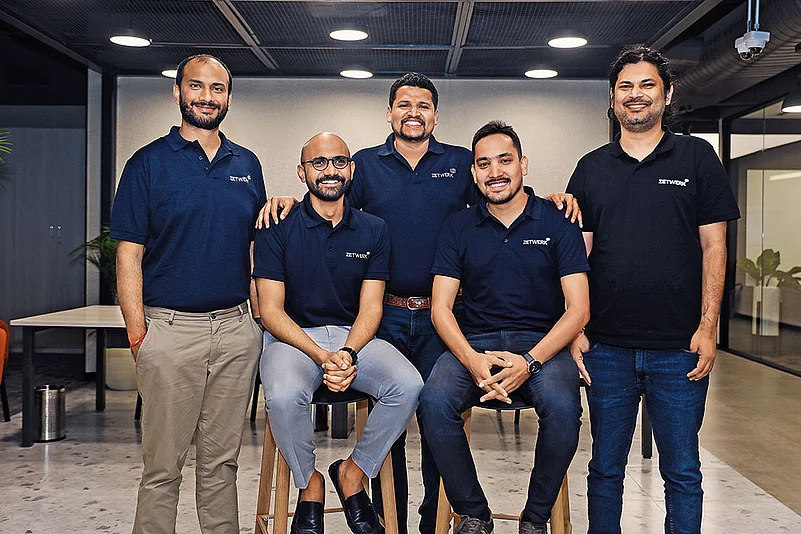When Amrit Acharya, Srinath Ramakkrushnan, Rahul Sharma, Ankit Fatehpuria and Vishal Chaudhary founded Zetwerk—an Indian business-to-business marketplace for manufacturing items—in 2018, the idea was to fix the core pain points of the manufacturing ecosystem, such as identifying the right supplier, managing spending, tracking progress, lifecycle, etc. But the four IITians, just like the rest of the world, did not anticipate the Covid-19 pandemic.
As Zetwerk’s revenue came from the industrial segment (oil and gas, infrastructure, etc.), which was entirely generated from the Indian markets, the pandemic brought the company to a standstill. As India locked down in April 2020, Zetwerk’s revenue dropped by 90%.
The founders did not want to shut down the start-up. So, instead of giving up, they decided to restrategise and diversify into different sectors and geographies. Zetwerk diversified its business mix from 100% industrials to 30% consumer and 70% industrials over the next two years. Within the consumer segment, it started doing business with customers across apparel, retail and consumer electronics segments.
Geographically too, it diversified over the two years, going from 100% India business to 86% in India and 14% international. This strategy helped Zetwerk enter the coveted unicorn club in August 2021, within four years of starting up—not a small achievement.
Today, Zetwerk has more than 300 customers outside India, primarily in North America, which accounts for 70% of its global sales. In the process, it transformed the business from a loss-making entity in the pre-Covid era to a profitable one—it recorded a profit of Rs 57 crore of EBITDA from operations, excluding non-cash employee stock ownership plan expenses. Also, it clocked a gross merchandise value (GMV) of Rs 5,718 crore in FY22, which was six times higher than the previous year. Its operating revenue stood at Rs 4,961 crore in FY22, a six-fold jump from Rs 835 crore last year.
The Global Turnaround
During Covid-19, when the supply chains were disrupted around the world, Zetwerk became a partner to both domestic and global players. The company also took advantage of the supply chain disruptions in China.
It was also the time when China’s supply chain became unreliable for the US due to uncertain wait times, high logistics costs and clogging at the ports. Additional tariffs between the US and China exacerbated this issue. During this time, India presented itself as a strong alternative, which was often more reliable than China, as part of a worldwide shift away from China. Zetwerk saw it as an opportunity to expand its clientele.
“Today, our international business contributes nearly 14% of Zetwerk’s total revenue, and we work with more than 200 customers in these markets. Most of these customers are first-time buyers of the Indian supply chain. Zetwerk makes sure that the products are made on time, with pristine quality, providing complete visibility and transparency to the manufacturing process. We have opened offices in the US to be closer to our customers,” says Acharya, its CEO.
Winning on Home Turf
Back home, Zetwerk operates in 12 or 13 supply chains like oil and gas, railways, aerospace and defense, consumer electronics, etc. It is looking to go deeper into each of these segments. “Our consumer business, which we launched in 2020, contributes about 25% to our total revenue. We expect that figure to go up to 40% in the next few years. In addition, we will look at strategic acquisitions in India and globally, which will help us expand our footsteps further,” says Acharya.
The company is also helping Indian brands shift production from China to India and become more atmanirbhar, as the current policy is called. For example, it has created a complete design-to-delivery facility in Noida in Uttar Pradesh in the wearables and hearables space for electronics manufacturing services and original design manufacturing solutions for some of the top consumer electronics brands in India. “India is on the cusp of a revolution in consumer electronics, and we want to lead that; this strategy contributes to approximately 10% of the company’s revenue,” adds Acharya.
The unicorn did a few acquisitions to strengthen its defense and oil and gas segments as well. This year, it acquired Pinaka Aerospace Solutions for aerospace and defense manufacturing capabilities, bagged a majority stake in SharpTanks to increase its exposure to the oil and gas industry and bought a 100% stake in the Wardha fabrication unit of Wheels India to tap into a $1.5 billion market comprising the manufacturing of critical fabricated parts for power, roads and railways.
Recipe for Success
At a time when most start-ups have been struggling to survive, how did a new company like Zetwerk hold its ground? Acharya explains: “Our business is insulated from more significant macro trends. The company is profitable and well-capitalised. Most of the money that we raised is in the banks, and we are generating cash from our operations to run our business.” He adds that the company’s strategy to diversify into newer categories and geographies has given it additional hedge against macro headwinds in the global economy.
Acharya believes that it is the product-market fit that is most important in a business, adding that small and medium enterprises play a crucial role in its strategy to survive. “Zetwerk is creating a shared economy for business in one of the most complex areas of manufacturing and EPC [engineering, procurement and construction] around the world. It works with over 10,000 small and medium enterprises, which leads to one lakh indirect job opportunities,” he says.
The founders believe that manufacturing can be made seamless through software-driven manufacturing. Zetwerk uses domain-specialised teams and a suite of software across its suppliers and customers in matching, production and project management, quality, pricing and logistics to make manufacturing predictable, transparent and reliable.
Whether it continues to have a bull run with its customers across the globe and keeps refining its strategy to sprint towards a brighter future will have to be seen. As of now, it surely has proven its mettle.






























